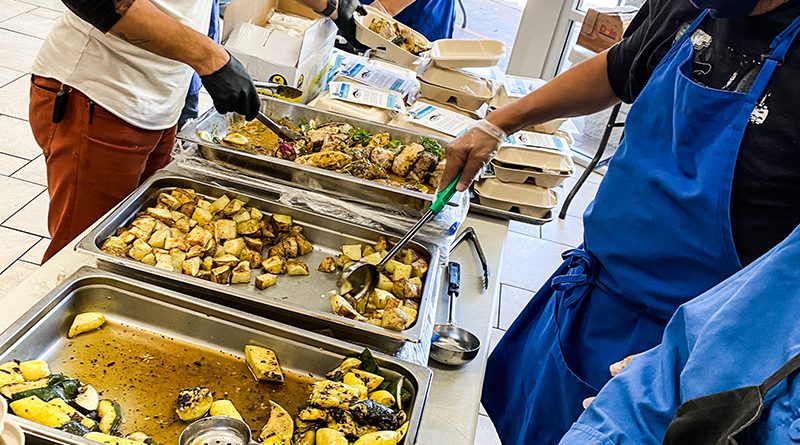New Programs Popping Up Connect Fishermen to Food Banks
Innovative partnerships help fishermen and seafood farmers share the bounty of the sea with those who have less.
SAN DIEGO— In 2020 San Diego launched Fish to Families, a program that buys fish from local fishermen and distributes healthy, fresh, and sustainable seafood meals to people in need. The program has been running for a year and is currently blossoming during the holiday season.
Fish to Families is overseen by the San Diego Fisherman’s Working Group and Chef Phillip Esteban with his group OpenGym, a self-sustaining nonprofit based in San Diego; and is funded by the San Diego Foundation with support from Marine Alliances Consulting who leads the efforts to find and secure funding. Meal distribution to those in need is supported by charitable community organizations, including Father Joe’s Villages, Good Neighbor Project, Our Savior Lutheran Church, Olivewood Gardens, and Project New Village. Marine Alliances Consulting has and continues to lead efforts to find and secure financial support for the program.
California Sea Grant Extension Specialist Theresa Talley and National Oceanic Atmospheric Administration Fisheries Biologist Sarah Shoffler have created educational evidence presented with the meals meant to inform San Diegans about their local commercial fishing community and the sustainable seafood products they provide. They are also helping to track program impacts.
A similar program began in Honolulu during the summer of 2020; the City and County of Honolulu established the “Fish to Dish” program using Coronavirus Aid, Relief, and Economic Security (CARES) Act funds.
The Hawaiian longline fishing industry, an industry hit hard by COVID-19, aims for high-value fish such as tuna and swordfish and sells their fresh catches at the Honolulu Fish Auction.
When the pandemic shut down restaurants and halted tourism, the fishing industry suffered some steep declines, but fresh fish is also an important food source for Hawaii residents, who eat twice as much seafood as average Americans. The “Fish to Dish” program is supporting Hawaii’s longline fishing industry and distributing fresh fish to communities across the island of Oahu. In addition, the program offsets vessel operating costs, and gets longline fishermen back out on the water to catch fish and supplies funds to purchase the longliner’s fish at auction. The program has ultimately donated more than 110,000 pounds of filleted fish to local kūpuna (seniors) and families in need.
“As we all do our part to make Oahu COVID-safe for one another, we must also take bold steps toward economic recovery and revitalization,” said Honolulu Mayor Kirk Caldwell in a press release. “The way we rebuild is by constantly asking ourselves how we can better use the resources and abilities of our own people to help each other in this time of great need. ‘Fish to Dish’ is one way that the City and County of Honolulu is adapting to the ever-changing crisis and acting on the best ideas.”
The fishing industry is one of the local sectors in Hawaii, hit hard by the severe plunge in customer demand for fish during the COVID-19 emergency. The “Fish” portion of the program has provided CARES Act funds to more than 140 Hawaii Longline Association vessels. In addition, the Association allotted funds to help cover vessel operating fees for over three months. Fishing boats that cooperate with the program deliver fish to the Honolulu fish auction for purchase.
At the fish auction, the Hawaii Seafood Council introduced the “Dish” part of the program by purchasing over 100,000 pounds of filleted fish that was turned into 350,000 servings. These fillets are given to the Hawaii Foodbank to distribute through its partner organizations. Next, prepared fish is served to seniors and other hungry families across Oahu.
“The partnerships in this program give me so much confidence that we will win the fight against COVID-19,” said Caldwell. “My thanks to the Hawaii Longline Association, Hawaii Seafood Council, Hawaii Foodbank, and its partner organizations, and all the government employees who worked so hard to build this program to help so many across our island. This is what we can achieve when we work together as one community.”
In addition to “Fish to Dish,” the City and County of Honolulu recently made small commercial fishermen eligible for its Small Business Relief and Recovery Fund applicant pool. Furthermore, the State of Hawaii has agreed to pick up funding support for the Hawaii Longline Association after the initial three-month period funded by the City and County of Honolulu. Together, these policies will help the critically important Hawaii fishing industry during this economic downturn and, at the same time, will help supply fresh fish to the people of Oahu.
More information about the Small Business Relief and Recovery Fund can be found on the programs website. For more information regarding Fish to Families, contact Thersea Talley at tstalley@ucsd.edu.


